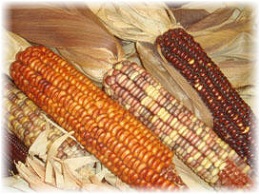
Sugar is Bad, But is High Fructose Corn Syrup Worse?
High fructose corn syrup (HFCS) is now an ingredient in almost every processed food, biscuits, soft drinks, jams, ketchup, candy bars, fruit juices, cookies, chocolates, yoghurt, pizzas, beers, cakes, breads, cereal bars, salad dressings, potato chips, etc, you name it.
"Fructose" and "corn" conjure in our minds images of ears of juicy corns and baskets of fresh fruits. The name high fructose corn syrup sounds rather harmless, and in fact even suggests substances that are natural and healthy, but what exactly is it?
HFCS is a highly processed sweetener made from white corn starch. The glucose yielded from the processing is further processed to produce a high percentage of fructose. HFCS has the same sweet taste as sucrose from cane sugar but its production process is chemical-laden and much more complicated. Businessmen and manufacturers value it because it's 75% sweeter than sugar, it blends well into foods, it's easy to transport in tanker trucks, it has a long shelf life (due to the addition of genetically modified enzymes), and bottom-line, it's a lot cheaper. Today, most of us consume more HFCS than sugar.

High fructose corn syrup suppliers argued that as HCFS and table sugar both are made up of about 50 percent fructose and 50 percent glucose, they are just as sweet, have about the same Glycemic Index, contain 4 calories per gram, and they have the same impact on our body. In an opposite tone, many nutritional science studies have reported that HFCS is worse than sugar as the fructose level in HFCS can reach as high as 65 percent. The glucose and fructose molecules in table sugar are bonded together in 1-to-1. When sucrose enters the stomach, the glucose and fructose molecules are channelled to either the bloodstream (for glucose) or to the liver (fructose). It is said that the body processes the fructose in HFCS differently than it does for sugar, which in turn changes the way metabolic regulating hormones function. When the altered fructose is metabolized in the liver, it tends to turn into triglycerides, kicking more fat out into the bloodstream, and increasing risk for heart diseases. Several recent studies show that drinking large amounts of carbonated beverage is associated with increased risk for obesity. Scientists also found that drinks containing HFCS had high levels of reactive carbonyls shown to have the potential to trigger cell and tissue damage that could cause diabetes.
Whatever it is, cane sugar or HFCS, for the sake of better health, avoid excessive sugary junks. Taking too much sugar is bad enough. In general, unlike glucose, fructose does not stimulate insulin production, which creates a sense of being full and sends a "stop eating" signal to the brain. As a result, people eat more than they should and find themselves in weight problems. Be more diligent in reading food labels so that you can minimize sugar and HFCS in your diet, and try to go for fresh, whole foods whenever you can.
Truths About Corn Syrup Can Save Your Life
1) Corn syrup is made from corn...and is fine in moderation? This is what the Corn Refiners Association in United States is disseminating and propagating on national TV - that HFCS is natural and safe for your health. Lies and treacheries.
2) Ironic as it may seem, so-called "fruit sugars" can be dangerous for diabetics. Read Fructose Corn Syrup or Fruit Sugar?.